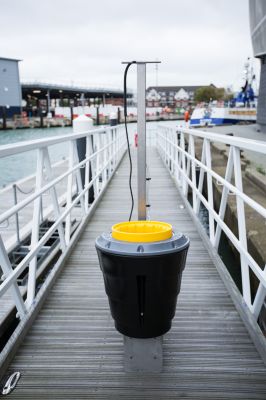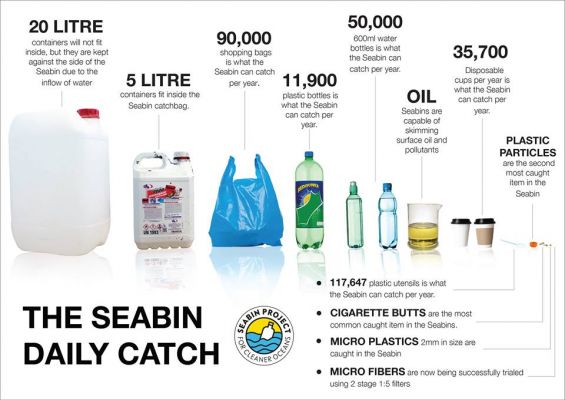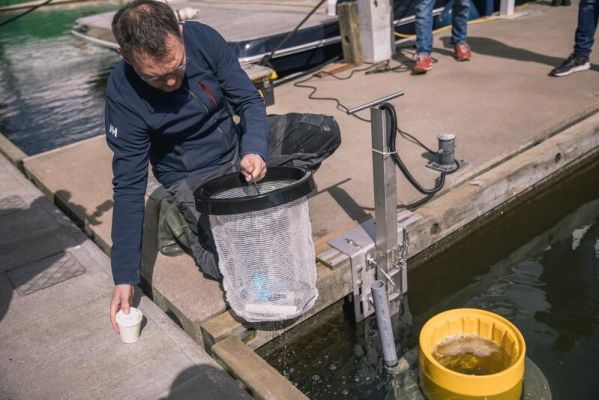Innovative sea bin will catch litter in the Baltic
Between 4.8 and 12.7 million tonnes of plastic still end up in the seas and oceans! This means that every minute an amount equivalent to the volume of one garbage truck enters marine waters. In the Baltic, the situation is similar. It is estimated that more than 60% of marine litter in our sea and the beaches is plastic of different kind. To help on solving the problem of marine litter in the Baltic, the MARE Foundation bought a SEABIN – an innovative sea bin, recently installed in the Gdańsk Żabi Kruk. The sea bin was bought using the funds from the 1% tax donation to MARE. The Gdańsk Sports Centre was the partner.
Collecting litter on the beaches is not enough, it is also necessary to collect litter in the water, where it is found in enormous amounts and poses a great threat to people and nature. One sea bin can collect up to 1.400 kg marine litter. This is a small big step towards a cleaner and safer Baltic - says Olga Sarna, the Chair of the MARE Foundation.
SEABIN was invented by Andrew Turton and Pete Ceglinski, two Australian surfers, sailors and boatbuilders, who had spent most of their life in the ocean and were frustrated by the huge amount of litter in the water. They decided to act and find a solution to this global problem.
In 2016 the SEABIN project was set up. The Seabin unit is a “trash skimmer” designed to be installed in the water of marinas, Yacht Clubs, ports and any water body with a calm environment and suitable services available. The unit acts as a floating garbage bin skimming the surface of the water by pumping water into the device. The Seabin can intercept: floating debris, macro and micro plastics and even micro fibres with an additional filter. By acting as a trash skimmer, the Seabin V5 is also able to clean the water from contaminated organic material (leaves, seaweed, etc…) and oil .
In one year, one SEABIN can remove:
- 90.000 plastic bags
- 35.000 disposable cups
- 16.500 plastic bottles
- 166.500 plastic straws
Annually, one SEABIN can collect up to 1.5 tonnes of litter. 860 bins were installed so far in 52 countries, including 3 in Poland, two in the Gdańsk Marina and one in Łeba.
Such bin should be installed in every marina and port. We hope to install more bins, but we need the support of all sea lovers to buy them. Help us to protect the Baltic. Donate 1% of your taxes to the Foundation and we will buy more bins - adds Sarna from the MARE Foundation.
For the last 10 years, we have produced more plastic than in the last century.
The problem of plastic pollution is highly visible in the seas and oceans. The scientists had been warning about such scenario for years, but few people bothered to take this problem seriously. At present, it is estimated that about 400 million tonnes of plastic litter float in the oceans. Such amount has a considerable impact on the marine ecosystems. It should be underlined that Plastic does not decompose, but only breaks down into smaller and smaller particles, the so-called microplastic (particles below 5 mm), which remain forever in the ecosystem. Due to their small size, microplastics are easily wallowed by living organisms and thus enter the food chain. Recently, microplastic particles have been found in drinking water and such food products as salt or honey. Their effects on human health are not yet known.
The MARE Foundation has been working for the benefit of the Baltic Sea for years. It is the only non-governmental organisation in Poland focusing on the protection of marine ecosystems, with particular emphasis on the protection of the Baltic. Its main activities include the marine litter (ghost nets, plastic) hazardous wrecks and education.



